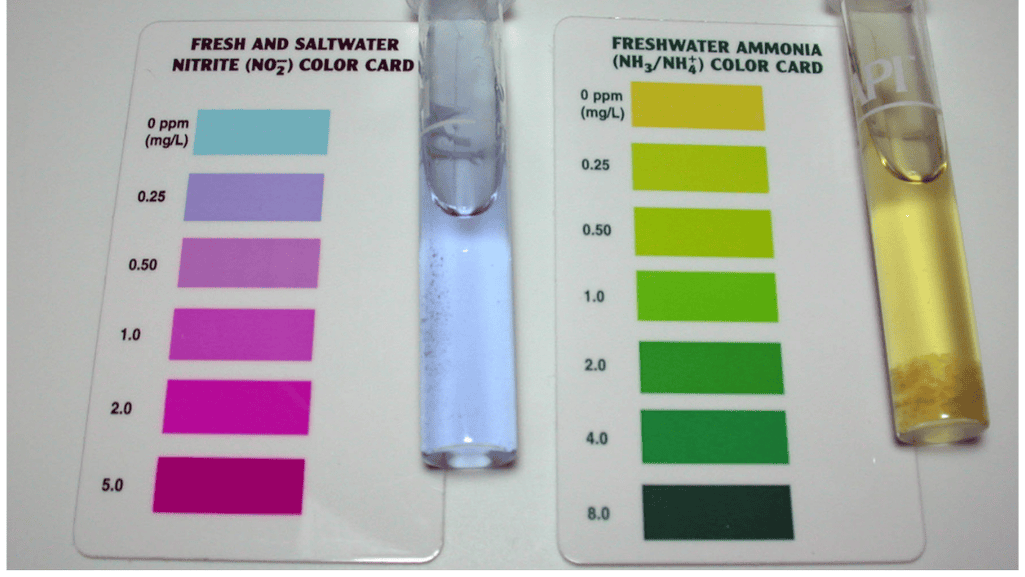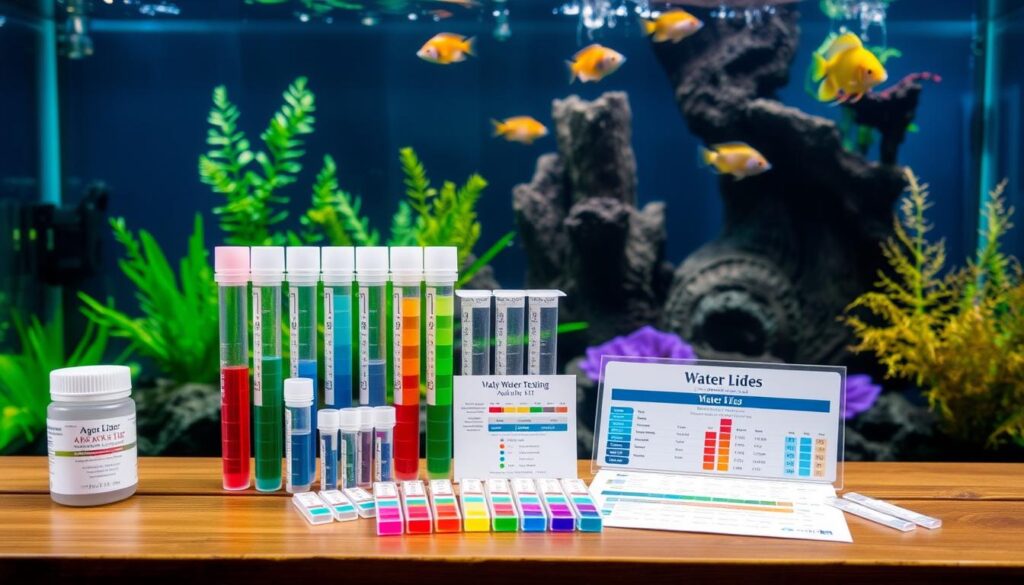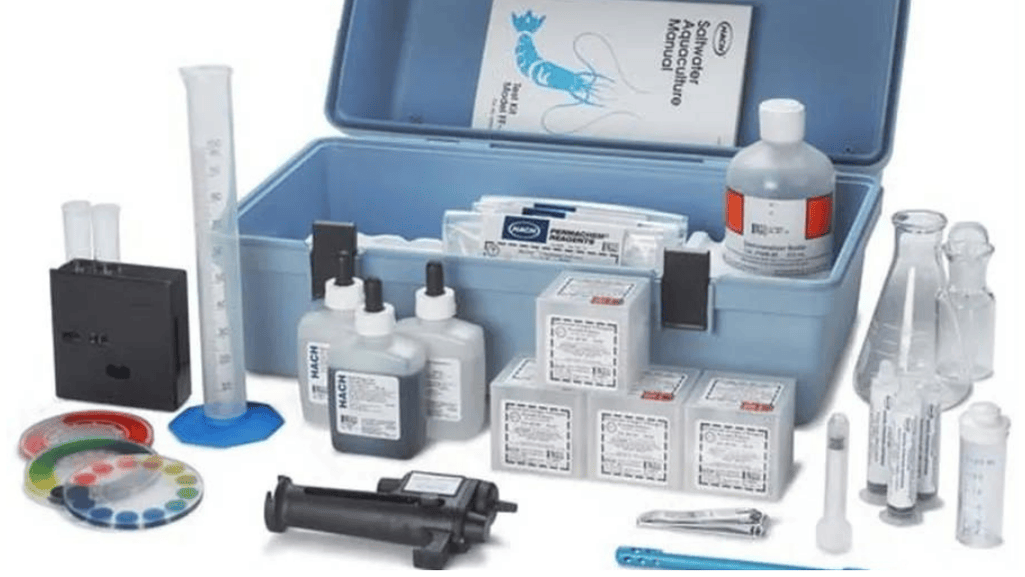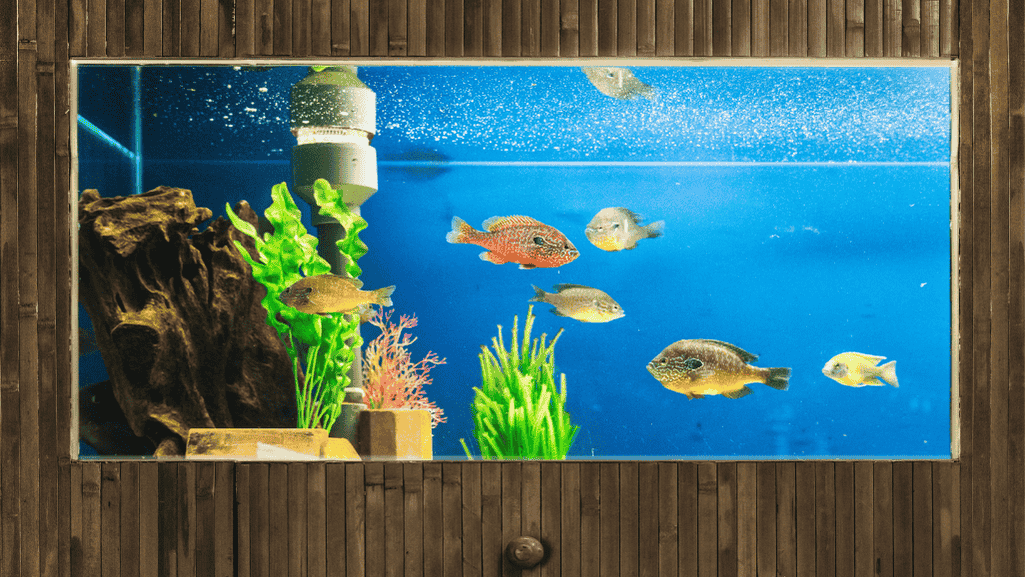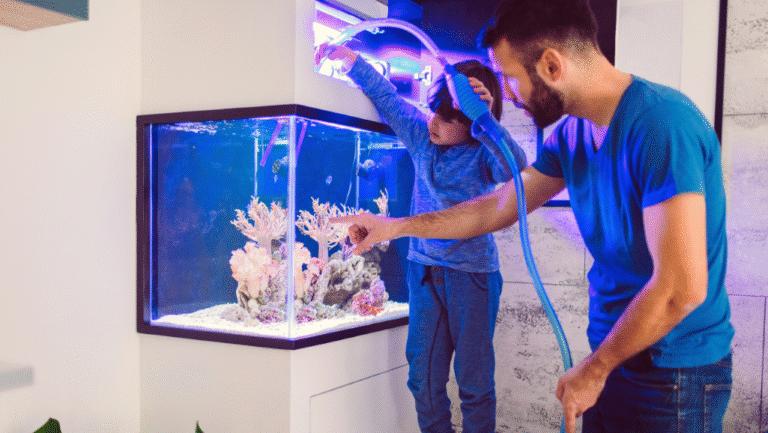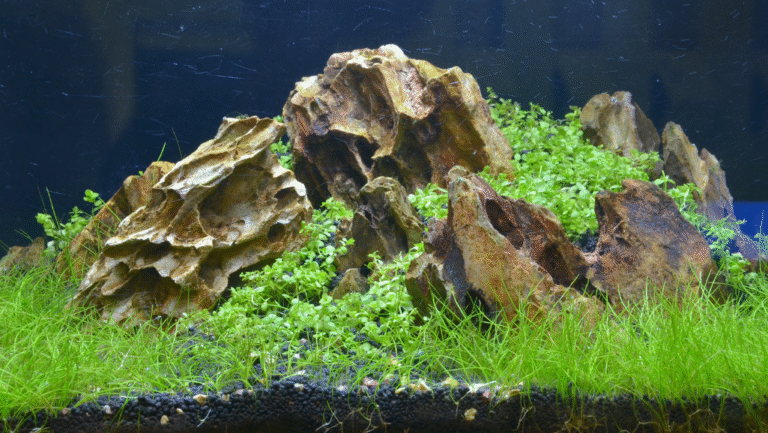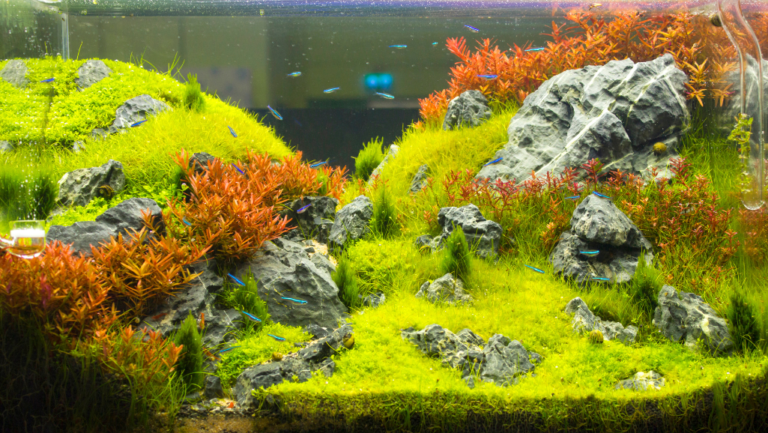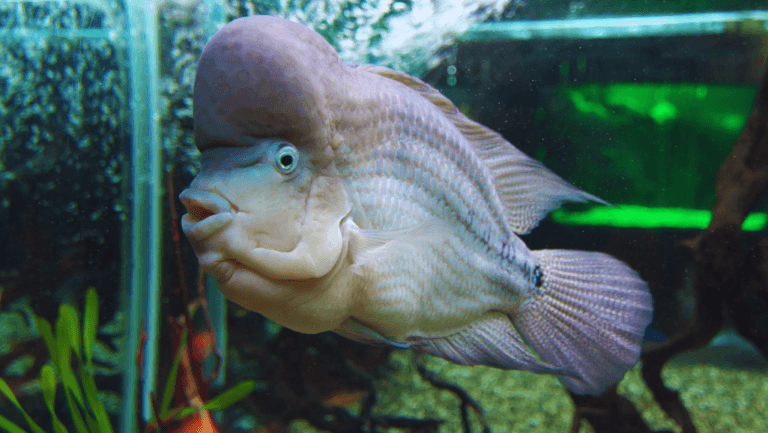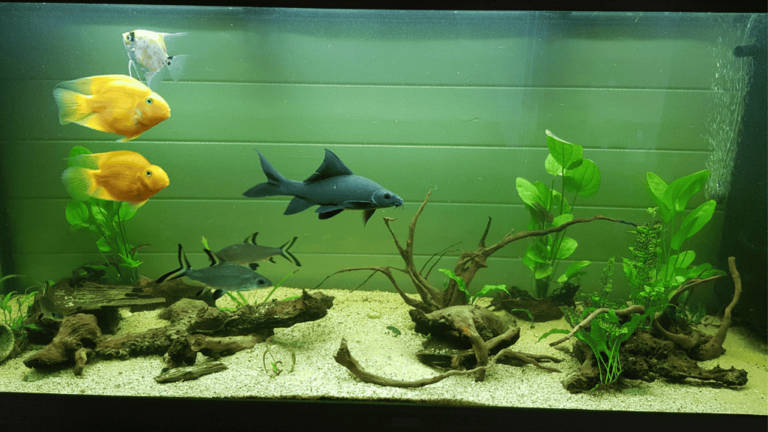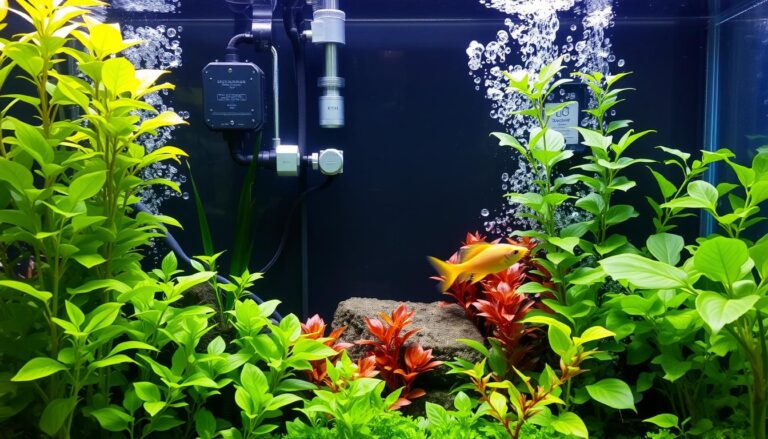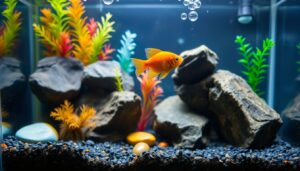Keeping your aquarium water clean is crucial for your fish’s health. You need a good best aquarium water testing kit to spot hidden dangers like harmful chemicals from waste. It’s not just about clear water; it’s about making sure every drop is safe for your fish and plants.
Managing an aquarium’s ecosystem is a delicate task. Even experts must watch aquarium water quality test results closely. Whether you’re new or experienced, knowing the right water conditions is key. It’s not just good to know; it’s necessary for caring for your aquarium.
Key Takeaways
- Investing in the best aquarium water testing kit is essential for early detection of harmful compounds.
- Regular aquarium water quality tests are crucial for maintaining a safe environment for fish and plants.
- Ammonia levels should always be at 0 ppm to ensure fish health and tank stability.
- Reliable aquarium water testing supplies can remain effective for years if stored properly and not subjected to extreme conditions.
- Expired or improperly stored test kits can produce inaccurate results, endangering the well-being of sensitive aquatic species.
- Routine water tests and monitoring of parameters like pH, nitrate, and ammonia can prevent the leading cause of fish mortality.
- Understanding and adjusting to the specific water quality needs of diverse fish species is key to a thriving aquarium.
The Hidden Dangers in Your Aquarium Water
Keeping your aquarium healthy starts with knowing and fighting the hidden dangers in the water. These dangers include harmful chemicals, too many nutrients, and changes in water levels. They can harm your fish and plants.
To fight these dangers, using aquarium water quality testers, freshwater aquarium test kits, and saltwater aquarium test kits is key. These tools help you keep the water clean. This makes a safe home for your fish and plants.
For example, too much algae can mean too many nutrients. Different algae types show different water problems:
- Green algae means too much food or waste, showing high nutrient levels.
- Blue-green algae, or cyanobacteria, form slimy mats and show poor water quality.
- Brown algae in new tanks might mean silicates from decorations or substrates, affecting water quality.
Keeping the right carbonate levels is also important. In freshwater tanks, levels should be between 50-150 ppm. But, levels over 200 ppm can raise pH too high, risking your fish’s health. Using a saltwater aquarium test kit or a freshwater aquarium test kit helps monitor these levels.
To fix imbalances, you can:
- Do regular water changes to lower carbonate levels.
- Use reverse osmosis (RO) water to slowly decrease carbonate hardness.
- Add peat moss or driftwood to soften the water naturally.
- Use commercial water conditioners to bind with and remove carbonates.
Testing your aquarium water often with a good aquarium water quality tester helps. It lets you find and fix problems early. This keeps your aquarium healthy and thriving.
Understanding the Essential Aquarium Water Parameters
Keeping water parameters in check is key for your aquarium’s health. The right best water test kit for aquariums is crucial. This guide will help you understand the main parameters and how to use different kits to monitor them.
A Guide to Ammonia, Nitrite, and Nitrate Levels
Ammonia is toxic and should be at 0 ppm. It’s dangerous, so using ammonia test strips often is vital. Nitrite is also harmful, even in small amounts. Thanks to freshwater aquarium water testing supplies, you can quickly spot and fix these issues.
Nitrate is less toxic but still important. It should stay under 50 ppm to keep your fish healthy.
The Importance of pH, GH, and KH in Fish Health
The pH level is crucial for your tank’s chemistry. It should be between 6.5 and 8.0 for most fish. The API Aquarium Test Kit helps keep this range stable.
General hardness (GH) and carbonate hardness (KH) are also important. They help prevent sudden pH changes. This keeps your fish healthy.
Monitoring Chlorine, Phosphate, and Copper
Chlorine and Chloramine in tap water need to be removed. Phosphate levels should be checked to prevent algae growth. This affects your fish and water clarity.
Copper test kits are essential for treating diseases. Copper can be toxic, especially to invertebrates.
Digital aquarium water tester devices offer precise readings. They’re great for pH and salinity. For more detailed data, professional aquarium water testing kits are perfect for advanced enthusiasts.
With the best aquarium water testing kits, keeping your aquarium healthy is easier. Regular tests help ensure a safe and thriving environment for your fish.
Choosing the Right Aquarium Water Testing Kits
For aquarium lovers, keeping the water quality right is key for their fish’s health. It’s important to pick the right water quality test kits for aquariums. This means knowing the different types and what they offer. We’ll look at everything from accurate aquarium water test strips to advanced aquarium water testing supplies. This will help you choose the best one for your needs.
Advantages of Test Strips Over Test Tubes
Test strips are loved by both new and experienced aquarium owners. They’re easy to use and quick to give results. You can get results in just one minute and check many water qualities at once. With 25-50 tests in each package, they’re also affordable and fast.
This is great for keeping an eye on your water often. It helps keep your tank stable and healthy for your fish.
Options for Digital Aquarium Water Testers
Digital testers bring a new level of precision to aquarium care. They don’t need color charts like old methods. Instead, they give clear numbers for important things like pH and TDS.
These best digital aquarium water testing kits are perfect for both fresh and saltwater tanks. They’re great for keeping the water just right for your fish’s home.
Navigating Through Different Brand Reviews
Looking at aquarium water testing kit reviews can give you a better idea of what to choose. Brands like API are known for their detailed kits. For example, the API Water Test Kit checks nitrites, nitrates, ammonia, and pH levels.
What other fish keepers say can help you find the top rated aquarium water test kits. It can also help you avoid mistakes in testing your water.
Good water quality is about more than just fixing problems. It’s about preventing them too. By picking the right kit for your level and tank needs, you’ll have a healthier home for your fish. Plus, knowing your fish’s size and species helps with better water care and testing.
| Type of Test | Accuracy | Time for Results | Ease of Use |
|---|---|---|---|
| Strip Tests | Good | 1 minute | Very Easy |
| Digital Tests | Very High | Immediate | Easy |
| Drop Tests | High | 1-10 minutes | Moderate |
| Permanent Tests | Moderate | Continuous | Setup Required |
How to Test Aquarium Water Correctly
To keep your aquarium healthy, it’s key to know how to test aquarium water accurately. Aquarium water quality testing kits come in different types, like fish tank water test strips, digital meters, and liquid kits. Picking the right one is vital for checking your water’s health and keeping your fish safe.
Testing kits help check your water’s health. They are a must for anyone who keeps fish. Even if fish stores test the water, having your own kit lets you check often. This way, you can keep an eye on important things like ammonia, pH, nitrite, and nitrate levels at home.
- Ammonia: It’s crucial to test this often; levels should always be at 0.0ppm to avoid harm.
- Nitrite: Also, it should be at 0.0ppm; any amount is dangerous.
- Nitrate: Keep this below 40ppm in freshwater tanks; it helps prevent algae and keeps the tank healthy.
- pH Levels: Freshwater fish like levels between 6.5 to 7.5 pH. Saltwater fish prefer levels above 8. Test these monthly and after big changes in your tank.
Using fish tank water test strips is simple. Just dip the strip in the tank for a few seconds and compare it to a chart. This makes strips great for quick checks. For more detailed tests, you might need advanced aquarium water quality testing kits that give digital readings for things like water temperature and phosphate levels. These are important to watch too.
For good tank care:
- Test pH and nitrate monthly, or more often if you see health issues in fish or water clarity problems.
- Use test results to adjust your care routine, like water changes and filter checks. Changing about 25% of the tank water weekly can help manage nitrites well.
- Check phosphate levels often, especially if you have algae problems. High phosphate can cause algae to grow.
Following these steps will keep your fish safe and make your tank look great. Remember, it’s always better to prevent problems than to fix them in your aquarium!
Aquarium Water Testing Kits for Freshwater vs. Saltwater Tanks
Setting up an aquarium means choosing between freshwater aquarium water testing kits and saltwater aquarium water testing kits. Each type needs special tools to check water quality. This is key for keeping fish healthy.
The best water testing kit for fish tank setups depends on the type of tank. Freshwater tanks need tests for pH, nitrate, and ammonia. The API Master Test Kit is good for these.
But, it misses tests for KH, Phosphate, and General Hardness. This means you might need to buy more. Saltwater tanks, on the other hand, need kits that check salinity and other ocean-specific things.
- API Master Test Kit: Includes pH, high pH, ammonia, nitrite, and nitrate tests but lacks KH, Phosphate, GH.
- Salifert Test Kits: Great for advanced saltwater setups, known for accuracy but too much for simple freshwater tanks.
- Hanna Checkers: Has tools like Alkalinity and Phosphate Checkers, good for precise freshwater tests but more expensive.
The API kit for ammonia can lose accuracy after a few weeks. This is a common problem. Aquarists talk about this on Reef Central. They discuss if API kits are good for both fresh and saltwater tanks.
Many experts suggest using different brands for better results. They recommend using digital testers and choosing brands known for their accuracy. This helps in both freshwater and saltwater tanks.
In short, picking the right freshwater and saltwater aquarium water testing kits is important. You need to think about your tank’s needs, the cost, and how long the tests last. Mixing different brands and keeping up with what others say is a good idea.
Top Rated Aquarium Water Testing Kits
Choosing the right tools for maintaining aquarium health starts with identifying the top rated aquarium water test kits. These kits give vital insights into the health of the water your aquatic life thrives in. Their accuracy and reliability are key, setting leaders like API and Fritz apart.
Comparing API, Fritz, and Other Industry Leaders
The API Aquarium Test Kit is known for its comprehensive approach. It checks parameters like pH, ammonia, nitrite, and nitrate levels, crucial for freshwater environments. On the other hand, Fritz offers specialized kits for marine ecosystems, measuring phosphate and copper levels.
What Makes a Water Testing Kit Reliable and Accurate
The reliability of a water testing kit for aquariums is about consistency and precise results. Liquid titration kits are often preferred for their detailed approach, offering more consistent results than test strips. While test strips are quick and easy for regular checks, they might lack the detail needed by serious hobbyists or professionals.
Digital testing methods have evolved, adding precision. Kits like the Digital Aquatics ReefKeeper provide real-time results with high accuracy, essential for managing sensitive aquatic environments.
The best professional aquarium water testing kits cover a wide range of parameters. This broad coverage ensures all potential issues are monitored, protecting against harmful substances.
| Kit Type | Parameters Tested | Suitability |
|---|---|---|
| API Freshwater Master Test Kit | pH, Ammonia, Nitrite, Nitrate | Freshwater |
| Fritz Specialty Kits | Phosphate, Copper | Marine |
| Digital Aquatics ReefKeeper | Multiple Parametric | Advanced Monitoring |
Choosing the best water test kit for aquariums is an investment in your aquatic life’s health and longevity. For comprehensive solutions, look for a kit that checks basic parameters and specialized metrics for your aquarium’s needs. Learn more by visiting this detailed guide.
When and How Often to Test Your Aquarium Water
Keeping your aquarium healthy is key for your fish’s well-being. Using the best aquarium water testing kits helps a lot. It’s important to know when and how often to test the water.
For new tanks, test the water every day. This is crucial to watch the cycling process. Beneficial bacteria need time to detoxify harmful chemicals. Once the tank is cycled, you can test less often.
As your tank matures, testing less often is okay. For established tanks, test water every two weeks to a month. Testing more often is needed when you add treatments or new fish or plants.
Also, test water right away if fish get sick or algae blooms. This helps find and fix problems fast. For planted tanks or large ponds, testing might need to be more frequent.
- Initial Daily Tests: Test ammonia, nitrite, and nitrate levels daily in new setups.
- Regular Maintenance: Shift to monthly testing once the aquarium is established.
- Check During Changes: Test immediately if adding new fish, after medication or changes in the tank environment.
- Plant and Pond Care: Adjust testing schedules as per plant needs and at least seasonally for ponds.
Using a detailed test kit like the API® FRESHWATER MASTER TEST KIT is a good idea. It checks pH, ammonia, nitrite, and nitrate levels. Sticking to a testing schedule helps your fish live in a healthy environment.
Cost-Effective Solutions: Affordable Aquarium Water Testing Kits
For those who care about their budget and their fish’s health, finding affordable aquarium water testing kits is key. These kits help keep your tank healthy and stable over time.
Choosing best value aquarium water testing supplies helps both new and seasoned fish keepers. Experts say new keepers should test their water often for a year. This helps them understand their tank’s ecosystem better. These kits are important for catching problems early, before they harm the fish.
- API’s Master Test Kit is a good choice. It tests pH, ammonia, nitrite, and nitrate levels.
- Even though it misses some tests, it’s still a great deal for many.
- Cost-effective water quality test kits are vital for detailed water analysis, especially when changing water sources.
Liquid titration kits are more accurate but cost more. They’re better than test strips, which can lose effectiveness over time. The comparative insights help users choose the right kit for their needs and budget.
| Test Kit Component | API Master Test Kit | Necessity After Cycling | Remarks |
|---|---|---|---|
| Nitrate | Included | Essential | Continuous monitoring advisable |
| Phosphate | Not included | Essential | Prevents algae, requires separate purchase |
| General Hardness (GH) | Not included | Essential | Ensures fish and plant health |
| Carbonate Hardness (KH) | Not included | Essential | Maintains stable pH levels |
In summary, affordable aquarium water testing kits are crucial for a healthy tank. By picking the best value aquarium water testing supplies, you can keep your fish healthy and avoid problems. It’s all about finding the right balance between cost and quality.
Professional Aquarium Water Testing Kits for Advanced Hobbyists
For serious aquarium fans, professional aquarium water testing kits are a must. These kits are precise and check many parameters. They help keep the water perfect for all kinds of fish and plants.
Advanced aquarium water testing supplies are key for those who want to know everything about their water. Top brands like ATI Lab and Triton Lab have kits that test many things. These tests help you make your aquarium look great and keep it healthy.
ICP-OES analysis is a standout test. It finds tiny amounts of important elements in the water. This is vital for keeping delicate reef systems healthy. Here’s a quick look at some top options:
| Brand | Parameters Covered | Technology Used | Turnaround |
|---|---|---|---|
| CoralVue (ICP-Analysis.com) | 40+ | ICP-OES | 48 hours |
| ATI Lab | 43 | ICP-OES, barcoded vials | Approx. 2 weeks |
| Triton Lab | 36 | ICP-OES, color scale indicator | Varies |
| Aqua Medic AWT | 13 | Colorimeters, spectrometers | Standard lab time |
Knowing what tests high quality aquatic water testing kits can do is crucial. Brands like Triton and ATI Lab offer tests for more elements. This is important for keeping very sensitive fish and plants healthy.
Want to learn more about setting up your aquarium? Check out AquaJoy’s guide to aquarium basics. It covers everything from choosing a tank to keeping the water just right.
Maximizing the Lifespan of Your Aquarium Testing Supplies
Keeping your aquarium testing supplies in good shape is key to a healthy tank. Focus on extending the life of your test kits, storing water test strips right, and caring for digital testers. This way, you get accurate readings and use your supplies for longer.
Proper storage of aquarium water test strips is very important. These strips are sensitive to humidity and temperature. Store them in airtight containers, away from sunlight and moisture. This keeps them working well and your water tests reliable.
Maintaining digital aquarium water testers means regular checks and care. Digital testers need occasional calibration to stay precise. Follow the maker’s advice for storage and use to keep them working well and last longer.
Here’s a quick guide to keeping your test kits in top shape:
| Test Kit Component | Storage Tips | Maintenance Tips |
|---|---|---|
| Test Strips | Store in a cool, dry place; keep sealed in original packaging. | Do not touch test areas; use before expiration date. |
| Digital Testers | Keep away from extreme temperatures; store upright in a protective case. | Calibrate as per instructions; regularly replace batteries. |
| Liquid Kits | Avoid direct sunlight; store in a stable environment. | Ensure caps are tight to avoid contamination and evaporation of reagents. |
By sticking to these tips, you not only extend your test kit’s life but also keep your readings accurate. This helps keep your aquarium a healthy home for your fish and other sea creatures.
Diagnosing and Solving Common Fish Tank Issues with Water Tests
Keeping the water in your fish tank perfect is key for your fish’s health. Using water test kits is a must for diagnosing aquarium issues and solving fish tank water problems. They help you check the water’s health, making sure it’s good for your fish.
By using water test kits effectively, you can spot dangers like ammonia and nitrite fast. These should be zero ppm to keep your fish safe. Also, checking pH, alkalinity, and other levels helps you see how your tank is doing. This lets you fix problems quickly.
| Parameter | Ideal Conditions | Testing Method |
|---|---|---|
| Ammonia | 0 ppm | Ammonia Test Strips |
| Nitrite | 0 ppm | Multi-Test Strips |
| Nitrate | < 50 ppm | Multi-Test Strips |
| Chlorine | 0 ppm | Multi-Test Strips |
| pH Freshwater | 6.5 – 8.0 | Multi-Test Strips |
| General Hardness (GH) | 4-8 dGH (70-140 ppm) | Multi-Test Strips |
| Carbonate Hardness (KH) | > 3 dKH (50 ppm) | Multi-Test Strips |
| Phosphate | 0.5-3 ppm depending on light | Fritz Phosphate Test Kit |
| Copper | Based on use (tap water or medication) | Fritz Copper Test Kit |
| CO2 | Varies with tank conditions | Dennerle CO2 Quick Test |
Regular testing helps you keep your tank stable and healthy. It’s key for your fish’s safety and for plants to thrive. Solving fish tank water problems is easier with today’s testing kits. These steps are crucial for a happy and long-lasting aquarium.
Conclusion
Keeping an aquarium healthy and balanced is a big job. It shows how important aquarium water testing kits are. We’ve seen that the best aquarium water testing kit can be different for everyone.
Some kits are quick and easy to use, giving fast results. Others are more detailed, offering precise analysis. These kits help both new and experienced aquarists keep their tanks healthy and colorful.
Testing the water regularly is essential for your fish’s home. It helps you know when to change the water or fix any problems. This keeps your fish safe and happy.
Using a complete aquarium water testing solution helps you take care of your tank. It lets you check for things like ammonia and pH levels. This is key to keeping your fish healthy and your water clear.
Testing your tank’s water regularly is a big part of caring for it. It helps you make sure your fish and water are doing well. By testing often, you can make sure your aquarium is a happy place for your fish.

